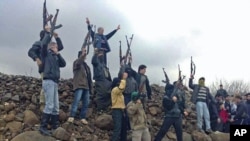Syrian government forces intensified their military crackdown against opposition forces near the capital, Damascus, retaking a number of key towns that had fallen to rebel soldiers in recent days. The fighting is occurring amid a frenzy of diplomatic activity to try to resolve the more than 10-month-old conflict.
Heavily armed Syrian government forces pounded a string of Damascus suburbs for a second day, reportedly retaking the towns of Saqba, Kafr Batna and Hammouriya from rebel soldiers. The shelling was so heavy in places that black smoke was visible on the horizon in Damascus.
An opposition supporter named Abou Ayman al Dimashqi told al-Hurra TV that government tanks and field artillery caused widespread destruction in several suburbs, and troops went house-to-house to arrest scores of people.
He said the suburb of East Ghouta was devastated by the shelling of buildings and civilian targets by government artillery, tanks, rockets, helicopters and planes in the face of lightly armed rebel soldiers. Al Dimashqi added that plumes of smoke poured into the sky over the town of Arbein, while government snipers deployed in Hammouriya, and troops made arrests.
Witnesses say hundreds of civilians fled the outlying suburbs for interior districts of Damascus. Government tanks and military hardware also were deployed in central squares of the capital to allay fears that rebel soldiers might breach the capital's defenses.
Opposition sources say more than several dozen civilians were killed in the government offensive, which included attacks on the cities of Homs, Daraa, Hama and Deir ez Zor. State-controlled TV reported six soldiers were killed near the southern city of Daraa. A gas pipeline near Homs also reportedly was blown up.
Video on opposition websites showed fields being flooded in Idlib province near the Turkish border. Opposition sources claimed the government opened dams to prevent civilians from fleeing to Turkey.
Al-Arabiya TV reported the government hanged a founder of the rebel forces, Hussein Harmoush. In a report that could not be independently confirmed, the Syrian League for Human Rights said he was executed last week.
Lieutenant Colonel Harmoush was the first Syrian officer to publicly declare his opposition to the deadly government crackdown on protesters. He fled to Turkey, where opposition activists say he was kidnapped and taken back to Syria.
Peter Harling of the International Crisis Group said the military balance is still “massively” in favor of the government, although its power has slowly been eroding. But he said it is not clear if and when the government might fall.
"The regime has been eroding for months now, but it still has an ability to do a tremendous amount of damage," said Harling. "But it is not in a position really to design and implement any strategy, let alone regain control over the country and start ruling anew. So now we see the crisis accelerating, the only question is, in what direction things are going into. It could be downfall, a collapse of the regime, it could be civil war, but there is no clear third option at this stage."
As fighting intensified, the U.N. Security Council prepared for talks about the Syrian crisis.
Meanwhile Russia, which has been blocking a Security Council resolution, indicated the Syrian government was ready to hold talks with the opposition in Moscow. But opposition sources are refusing to take part.
| Join the conversation on our social journalism site - Middle East Voices. Follow our Middle East reports on Twitter and discuss them on our Facebook page. |








